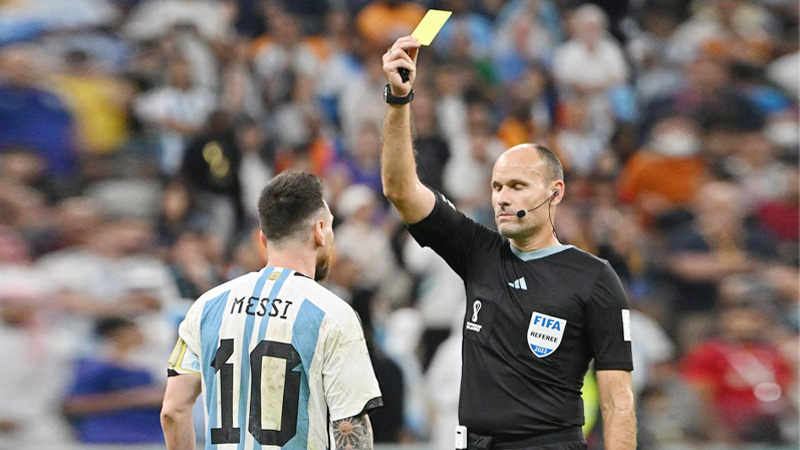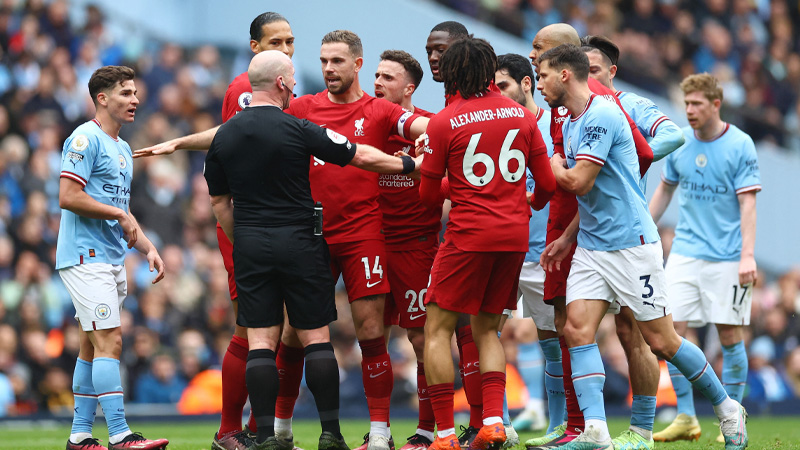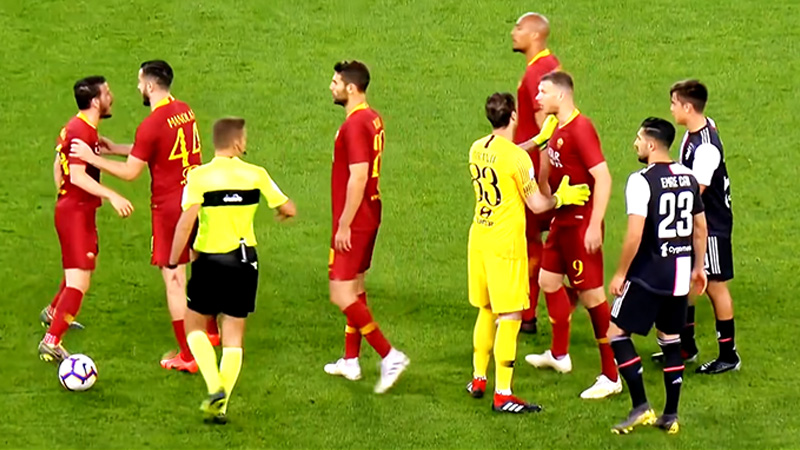Soccer, also known as football in many parts of the world, is a sport that captivates millions with its beauty, skill, and passion. It is a game that embodies teamwork, respect, and sportsmanship.
However, amidst the excitement and competition, instances of unsporting behavior can mar the spirit of the game. Soccer unsporting behavior refers to actions by players that deviate from the principles of fair play, integrity, and respect for opponents and match officials.
From diving to provoke a foul to dissent against decisions and from time-wasting tactics to deliberate handballs, unsporting behavior can manifest in various forms.
This behavior not only impacts the outcome of matches but also tarnishes the reputation of players and the sport itself.
This essay delves into soccer unsporting behavior and emphasizes the importance of upholding sportsmanship to preserve the true essence of soccer
What is Soccer Unsporting Behavior?
Soccer unsporting behavior refers to actions or conduct by players on the field that violate the principles of fair play, sportsmanship, and respect for the game, opponents, and officials.
Such behavior is generally discouraged and can result in disciplinary actions, such as warnings, yellow or red cards, and potential suspensions.
Here are some examples of unsporting behavior in soccer, along with paragraph descriptions for each point:
Diving/Simulation
Diving, also known as simulation or exaggerating contact, occurs when a player deliberately falls or feigns injury to deceive the referee into awarding a foul or penalty.
This unsporting behavior is aimed at gaining an unfair advantage and can lead to a free-kick or penalty being awarded wrongly, which undermines the integrity of the game.
Time-wasting
Players might engage in time-wasting tactics to slow down the game deliberately. Examples include excessively delaying a throw-in, goal kick, or substitution or taking an extended time to restart play after a stoppage.
Time-wasting disrupts the flow of the game and can be frustrating for both players and fans.
Dissent
This involves showing disrespect or arguing with the referee’s decisions, whether through words, gestures, or body language.
Players may surround the referee or use aggressive language, which undermines the authority of match officials and creates a hostile atmosphere on the field.
Deliberate Handball
Intentionally handling the ball to prevent an opponent from gaining an advantage or scoring a goal is considered unsporting behavior.
This may happen when players try to block a shot or pass with their hands in an unnatural position or when they attempt to gain an unfair advantage by handling the ball.
Verbal or Physical Abuse
Engaging in verbal abuse, offensive language, or making threatening gestures towards opponents, teammates, or officials is entirely unacceptable.
Physical altercations, pushing, or striking opponents also fall under this category, and such actions can lead to serious penalties and sanctions.
Time-wasting Tactics During Injury
When a player feigns injury or exaggerates the severity of a minor knock to waste time or disrupt the opponent’s momentum, it is seen as unsporting behavior.
This not only negatively impacts the game but also disrespects genuine injuries and medical staff.
Excessive celebration or taunting: While celebrating a goal is a natural part of the game, excessive celebrations, such as removing shirts, provocative gestures, or taunting opponents, can lead to unnecessary confrontations and incite crowd disturbances, affecting the overall spirit of the sport.
It is essential for players, coaches, and fans to understand the importance of fair play and uphold the principles of sportsmanship in soccer to maintain the integrity and enjoyment of the game for everyone involved.
Soccer governing bodies, like FIFA, actively work to enforce rules and regulations that discourage unsporting behavior and ensure the beautiful game remains a showcase of skill, respect, and camaraderie.
What Is The Result Of Soccer’s Non-Supporting Behavior?

Source: sportstar
Soccer unsporting behavior can have various consequences, both on an individual level for the player involved and on the broader game and its reputation.
Here are the potential results of unsporting behavior in soccer, each with a paragraph description:
Yellow Card
When a player engages in minor unsporting behavior, such as dissent or a first offense of diving, the referee may issue a yellow card as a cautionary measure.
The player receives a formal warning, and if they accumulate multiple yellow cards throughout a tournament or season, they may face further disciplinary action, such as a suspension for one or more matches.
Red Card and Ejection
More severe instances of unsporting behavior, such as violent conduct, serious foul play, or repeated offenses of certain unsporting acts, can lead to a straight red card.
The player is immediately sent off the field and cannot be replaced, leaving the team with a numerical disadvantage for the remainder of the match.
The player is also likely to face additional suspension for subsequent games.
Penalties or Free Kicks
Unsporting behavior that affects the outcome of the play, such as deliberate handballs or obstruction, can result in the opposing team being awarded a penalty kick or a free-kick in a dangerous position.
This can directly impact the scoreline and momentum of the game, potentially leading to an advantage for the opposing team.
Team Disadvantage
Unsporting behavior can disrupt a team’s rhythm and focus, particularly when players are cautioned or sent off.
Teams playing with a numerical disadvantage are more vulnerable to conceding goals and may find it challenging to mount successful attacks.
The absence of key players due to suspension can also weaken the team’s overall performance in subsequent matches.
Reputational Damage
Unsporting behavior, especially if it becomes highly publicized, can tarnish the reputation of individual players, teams, and even the sport itself.
Fans and sponsors may view such behavior negatively, impacting a player’s endorsements or a team’s financial support.
Repeated incidents of unsporting behavior can lead to long-term damage to a player’s or team’s image.
Fines and Sanctions
Soccer governing bodies, such as FIFA or UEFA, have strict guidelines for addressing unsporting behavior. They may impose fines on players or teams found guilty of certain offenses.
In more severe cases or for repeated misconduct, players or teams may face lengthier suspensions, fines, or point deductions in league competitions.
Impact on Fair Play
Unsporting behavior contradicts the principles of fair play, which is an integral part of soccer’s ethos.
It can diminish the overall spirit of the game and set a poor example for young players and fans, emphasizing the importance of respect, integrity, and good sportsmanship in all aspects of life.
Soccer authorities continuously strive to uphold the integrity of the game by enforcing rules and regulations, penalizing unsporting behavior, and promoting a culture of respect and fair competition among players, coaches, and fans.
It is crucial for individuals within the soccer community to recognize the consequences of unsporting behavior and strive to uphold the values that make soccer a beautiful and beloved sport worldwide.
What Is An Example Of Unsporting Behavior?

Source: reuters
Here are examples of unsporting behavior in soccer, each with a paragraph description:
Diving/Simulation
During a game, a player in the attacking team is dribbling toward the opponent’s penalty area.
As an opponent approaches to challenge for the ball, the attacking player intentionally falls to the ground, even though there was minimal or no contact.
The player pretends to be fouled in an attempt to deceive the referee into awarding a free-kick or penalty.
Diving is unsporting behavior as it seeks to gain an unfair advantage and undermines the integrity of the game.
Verbal Abuse Towards Referee
After a decision goes against their team, a player engages in heated arguments with the referee, using offensive language and showing disrespect towards the official.
The player continues to challenge the referee’s authority, refusing to back down from the confrontation.
Verbal abuse towards the referee is unsporting behavior and can lead to disciplinary actions, such as a caution (yellow card) or, in severe cases, a sending-off (red card).
Time-wasting Tactics
In the closing stages of a match, a team with a narrow lead deliberately engages in time-wasting tactics to run down the clock.
Players feign injuries, take an excessive amount of time to restart play, or engage in slow substitutions, all with the intent of disrupting the flow of the game and preserving their advantage.
Time-wasting is unsporting behavior as it goes against the principles of fair play and sportsmanship.
Deliberate Handball
A player, trying to prevent an opponent’s shot from reaching the goal, intentionally handles the ball using their arm or hand outside the bounds of a natural playing movement.
The act is deliberate and gives the player’s team an unfair advantage by preventing a goal-scoring opportunity. Deliberate handball is considered unsporting behavior and can lead to a penalty kick or free-kick being awarded to the opposing team.
Excessive Celebration and Taunting
After scoring a goal, a player removes their shirt and runs toward the opposing team’s fans, making provocative gestures and taunting the supporters.
The player’s actions incite confrontations and create a hostile atmosphere. Excessive celebration and taunting are unsporting behaviors that can lead to a caution (yellow card) for the player involved.
Tripping an Opponent
During a match, a player, frustrated with an opponent’s skillful dribbling, deliberately sticks out their leg to trip the opponent, causing them to fall to the ground.
The player’s intent was to disrupt the opponent’s progress unfairly. Tripping an opponent is unsporting behavior and can lead to a caution (yellow card) or, if deemed excessively reckless or dangerous, a sending-off (red card).
It is crucial for players, coaches, and fans to recognize and discourage unsporting behavior in soccer, as it goes against the fundamental principles of fair play, respect, and integrity that form the foundation of the beautiful game.
Proper sportsmanship and adherence to the rules are vital to ensure that soccer remains an enjoyable and competitive sport for all participants.
FAQ
What is soccer unsporting behavior?
Answer: Soccer unsporting behavior refers to actions or conduct by players on the field that go against the principles of fair play, sportsmanship, and respect for the game, opponents, and match officials.
What are the consequences of unsporting behavior in soccer?
Answer: The consequences of unsporting behavior in soccer can vary and may include receiving yellow or red cards, resulting in cautions or ejections from the game. Players may face suspensions for subsequent matches, fines, or even points deductions for their team.
How do referees identify unsporting behavior on the field?
Answer: Referees use various signals to identify and respond to unsporting behavior. They issue yellow cards for minor offenses, showing a formal warning to players. More severe infractions warrant red cards, resulting in immediate ejection from the match.
How can unsporting behavior impact a soccer match?
Answer: Unsporting behavior can significantly impact a soccer match by disrupting the flow of the game and affecting the outcome. Time-wasting tactics can slow down the pace and frustrate the opposing team.
How can soccer unsporting behavior be reduced?
Answer: Reducing unsporting behavior requires collective efforts from players, coaches, officials, and fans. Soccer governing bodies should continue to enforce strict rules and penalties to deter unsporting conduct.
Conclusion
Soccer’s unsporting behavior stands as a persistent challenge that threatens the essence of the world’s most popular sport.
As players, coaches, and fans, it is imperative to recognize that fair play, respect, and integrity are the pillars that uphold the beauty of soccer.
Embracing sportsmanship leads to not only a better game on the field but also sets an example for the next generation of athletes.
Soccer’s greatness lies in its ability to unite people across cultures and continents, and this unity can be amplified through displaying good conduct and genuine respect for opponents.
By condemning unsporting behavior and promoting positive values, we can ensure that soccer remains a sport that inspires, entertains, and unites, transcending borders and bringing joy to billions worldwide.
Let us cherish the spirit of the beautiful game and strive to maintain its integrity for generations to come.







